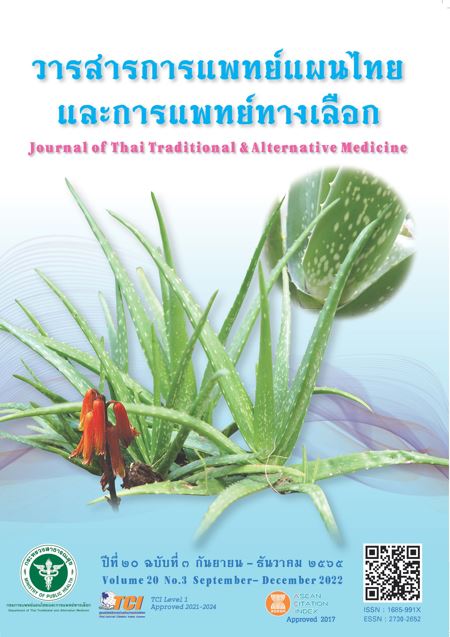A Study of Preparedness, Knowledge, Attitude, Motivation, and Other Related Factors Associated with Personnel’s Readiness to Participate in a Hospital Accreditation (HA) Assessment Program
Main Article Content
Abstract
The Thai Traditional and Integrated Medicine Hospital, located in Bangkok, had a plan to participate in the Institute of Thai Traditional Medicine (TTM)'s hospital accreditation (HA) assessment program in order for it to become Thailand's first Thai traditional medicine hospital with HA certification. As the majority of the hospital's staff members are TTM doctors and TTM assistants, who had little experience in the quality assurance process, they were not confident in getting assessed. So this study aimed to determine the levels of preparedness, knowledge, attitude, motivation, and other factors that affect staff readiness to join the HA process at the hospital. The study involved 150 hospital personnel including TTM doctors, TTM assistants, traditional Chinese medicine (TCM) doctors, TCM assistants, research assistants, patient helpers, pharmacists, registered nurses, general administration officers, and general service officiers. Data were collected and then analyzed using descriptive statistics and statistical correlation analysis to determine factors related to staff readiness. The results revealed that the respondents had a moderate level of readiness to be assessed, a low level of knowledge of quality assurance work, and a moderate level of attitudes and motivation towards quality development. Regarding the factors related to personnel’s quality development , their responsibilities, receipt of HA information, participation in the hospital quality development committee, knowledge, attitudes and motivation were significantly associated with the readiness to join the HA process (P = 0.05). As a result, three projects were designed and implemented to enhance staff readiness and ensure their passing of the HA assessments as follows: training on quality development; provision of staff welfare (drinking water, meals and recreational facilities); and assignment of each and every staff member to be a member on one of the hospital quality development teams.
Article Details

This work is licensed under a Creative Commons Attribution-NonCommercial-NoDerivatives 4.0 International License.
References
Institute of Traditional Medicine. Thai traditional medicine hospital accreditation guidelines. Nonthaburi: Department of Thai Traditional and Alternative Medicine; 2018. (in Thai)
Mungthong S, Rittirod T, Sritrakool R. Guidelines for service quality improvement to achieve hospital accreditation : A case study of BBB Hospital, Khon Kaen Province. Journal of Sakon Nakhon Hospital. 2018;21(3):129-37. (in Thai)
Eiamongard U. Factors related to personnel performance hospital accreditation Kaoyoy hospital in Phetchaburi Province. Phetchaburi: 2014. 75 p. (in Thai)
Bloom D. Mastery learning. UCLA – CSEIP evaluation comment. University of California at Los Angeles; 1968
Likert R. The method of constructing and attitude scale. In: Fishbeic M. (ed). Attitude theory and measurement. 1967. p. 90-95.
Bloom B. Taxonomy of educational objectives handbook. British Diabetic Association; 2003.
Netrabookana S, Thienkingkeaw W. Developmental model of supportive activities of hospital quality development by quality learning network in Krabi Province. Journal of Health Sciences, Thaksin University. 2020;2(3):80-92. (in Thai)
Thammakawinwong N, Wanaratwichit C. Factors influencing the continuous quality improvement of community hospital in regional health 3. Buddhachinaraj Medical Journal. 2016;33(2):178-89. (in Thai)
Poolperm S. The participation of sub-district health promotion hospital board in sub-district health promotion hospital management, Nong Khai Province (thesis). Public Health Services Management, Faculty of Public Health. Pathum Thani: Thammasat University; 2014. (218 p.). (in Thai)
Rattanavareewong S, Pensirinapa N, Jankong W. Factors related to the participation in quality development and hospital accreditation of health personnel at community hospitals in Bueng Kan Province. Journal of Safety and Health. 2014;7(26):48-58. (in Thai)


